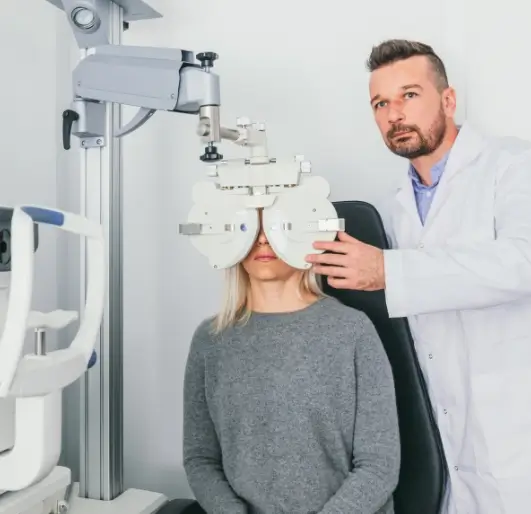Orbital Surgery
Orbital surgery takes about 45-90 minutes. Surgery may be performed under a general anesthetic or a local anesthetic with IV sedation. There is a 5% chance that you may need further surgery. It is unrealistic to expect perfect symmetry during this surgery.
As with any surgery, there are risks associated with orbital surgery. The rarest but most devastating is the irreversible loss of vision. There is also the risk of post-operative hemorrhage, excessive bleeding and excessive swelling.
Smoking causes poor healing and should be avoided to limit the risks of this surgery.
Orbital Decompression For Thyroid Related Eye Disease (TED) or "Graves' Disease"
Thyroid Related Eye Disease (TED) is an autoimmune condition. It's also known as thyroid-associated orbitopathy, and Graves' orbitopathy. In patients with the condition the immune system mistakenly attacks the thyroid gland, eye and orbital tissues, and sometimes the skin of the lower legs.
When patients with Thyroid disease develop ocular symptoms, the condition is known as TED or Graves' ophthalmopathy or Graves' orbitopathy. These patients may develop proptosis or bulging eyes. The space between the lids may widen, producing a staring appearance. Because the eye muscles are involved, some patients may develop double vision. In the worst cases, vision may be threatened by compression of the optic nerve.

Pre-Operative Instructions
- You should not drive to or from your surgery. Bring a friend or relative with you.
- Blood thinners (ASA, Warfarin, Pradaxa, Xarelto) are usually discontinued one week before surgery – please contact your prescribing doctor to make a specialized plan for you. Other blood thinners such as Vitamin E, Ginko Biloba, ginger, garlic, Advil, Motrin, Naproxen, and green tea also need to be discontinued a week before surgery.
- Do continue taking all of your regular medications, especially blood pressure medication.
- Please remove any eye make-up on the day of surgery.
- Make sure that your blood work has been completed at least three weeks before your surgery or as otherwise indicated by the office. Patients who have not completed their blood work could have their surgery cancelled. The blood work requisition is attached to the back of the paperwork. You do not need to fast for these blood tests.
Post-Operative Instructions
- Ice or frozen peas 10 minutes on and 10 minutes off. Continue for two days while you are awake. Do not leave ice on for any longer than 15 minutes – it will freeze the skin.
- Elevate the head (for nighttime sleeping) with an extra pillow or sleep in an easy chair. The ice and the elevation will help to reduce swelling.
- You can use teardrops or tear gel as often as you like for comfort.
- You can take Extra Strength Tylenol alternated with Advil for pain if needed.
- Continue to use any prescribed drops or ointments given by the office.
- After a few days, you can use warm compresses, if you want, for comfort.

What Is Normal After Surgery?
- It is normal to have fluid collect at the lower lids where the lid and cheekbone meet. This looks like a fluid blister and will go away on its own. Bruising, redness and swelling often last two weeks or more and are a normal reaction to the surgery.
- Double vision is a frequent problem after surgery but usually resolves with healing.
What Is NOT Normal After Surgery?
- Uncontrolled swelling, bruising, pain, and loss of vision are medical emergencies. If this happens, contact the office immediately or go to an emergency room.
- Excessive bleeding is rare. If you should experience excessive bleeding, apply pressure on the wound with ice packs. Lie quietly with your head elevated. Go to the nearest emergency department or contact the office if bleeding is uncontrolled.
- Loss of stitches and opening of the wound is not an emergency but should be addressed within a day or two. Please call the office, and we will arrange for you to be seen as soon as possible. Often the wound can be closed with tape or re-sutured without affecting the final scar.
- Fever.
Enucleation/Evisceration
Enucleation and evisceration are two orbital procedures our doctors can perform. Enucleation is the removal of the entire eyeball, whereas evisceration is the removal of the contents of the eyeball. Eye tumours or disease, severe injuries to the eye or severe pain in a non-seeing eye may require one of these procedures.
Enucleation/Evisceration Orbital Surgery
The surgery takes about forty-five minutes. We can do the surgery under general anesthetic or local anesthetic with IV Sedation. Most patients remain in the hospital overnight. During the surgery, the muscles and tissues that hold the eye in place are cut. The eyeball is then removed from the socket.
The Conformer
We patch the eye with a clear plastic conformer. The conformer will help the eye heal. After surgery, the eyes and lids will be too swollen to adapt to the conformer for the first few weeks. If it falls out, try to put it back in place and patch the eye for a day. Do not force it if there is too much swelling or discomfort. If the lower lid is too swollen, the conformer will not fit well enough, so wait a few days and try again.
Implant/Prosthesis
The artificial eye consists of two parts; a permanent implant and a removable prosthesis or shell.
When we remove the eyeball, a space is left. The doctor will insert an implant made of synthetic material. The implant is shaped like a marble. The eye muscles are attached to the tissue surrounding the implant. When you look into the eye socket after the implant is in place, you will see a bulge. This is the covered implant. The implant helps the eye prosthesis move with the other eye, so it looks natural.
The doctor will suture your eyelid shut during the surgery. This suture will dissolve on its own in 5 to 14 days. You should apply any drops or ointment on the outside of the eyelash ridge. It would be best if you used the eye patch as long as there is drainage.
Seeing An Ocularist
About 4 - 6 weeks after removing your eye, the socket will be healed, the swelling will be gone, and you can see Shirley Weyland, an ocularist at Calgary Ocular Prosthetics (415, 7015 Macleod Tr. SW, Calgary - 403-266-6460). The ocularist is a specialist that makes artificial eyes (prosthesis). She will design a prosthesis that is made of plastic and shaped like a shell. It fits over the tissues that cover the implant and is carefully painted to match your other eye. She will give you instructions about inserting, removing, and cleaning of the prosthesis. The appointment starts at 9:00 am - you will be back and forth several times throughout the day.
Call their office and arrange for this appointment. Once you have your follow-up with Shirley scheduled, please call our office at 403-245-3171 to book your follow-up with Dr. Ashenhurst.
Pre-operative Instructions:
- Make sure that your blood work has been completed at least three weeks before your surgery or as otherwise indicated by the office. Patients who have not completed their blood work could have their surgery cancelled. The blood work requisition is attached to the back of the paperwork. You do not need to fast for these blood tests.
- You should not drive to or from your surgery. Bring a friend or relative with you or take a taxi.
- Blood thinners (ASA, Warfarin, Pradaxa, Xarelto) are usually discontinued one week prior to surgery – please contact your prescribing doctor to make a specialized plan for you. Other blood thinners such as Vitamin E, Ginko Biloba, ginger, garlic, Advil, Motrin, Naproxen, and green tea need to be discontinued a week before surgery.
- Do continue taking all of your regular medications, especially blood pressure medications.
- Please do not wear any eye make-up on the day of your surgery.
Post-operative Instructions:
Please see our post-operative page for orbital surgery for more information for post-op care.
Risks Of Surgery
All surgery involves risks. General risks include, but aren't limited to; Bleeding, infection, sensory or motor nerve and tissue damage, cardiac arrest, or other serious bodily injuries.
Other risks specific to enucleation/evisceration surgery are as follows:
- Retrobulbar hemorrhage – bleeding at the back of the eye.
- Orbital edema – swelling around the eye area.
- Exposure, extrusion, or migration of the implant.
- Sympathetic ophthalmia in the opposite eye. The disease can result in vision loss. It is very rare (approximately 0.01%).
- Eyelid ptosis (droopy upper lid), ectropion (outward rotation of lid), entropion (inward rotation of lid).
- Poorly fitting prosthesis.
- Enophthalmos – the eye is displaced backwards.
Rescheduling Or Cancelling
If you need to cancel or reschedule your surgery, we need at least one week's notice. If you do not provide one week's notice, there will be a rebooking fee of $100. Exceptions are made for emergencies with supporting documentation. Please call Surgical Booking at 403-245-3171 as soon as you can.
